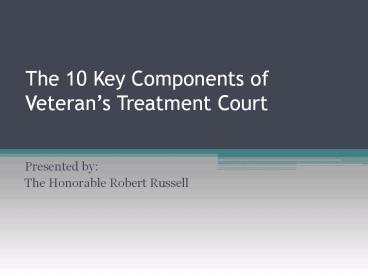The 10 Key Components of Veteran - PowerPoint PPT Presentation
Title:
The 10 Key Components of Veteran
Description:
The 10 Key Components of Veteran s Treatment Court Presented by: The Honorable Robert Russell – PowerPoint PPT presentation
Number of Views:84
Avg rating:3.0/5.0
Title: The 10 Key Components of Veteran
1
The 10 Key Components of Veterans Treatment Court
- Presented by
- The Honorable Robert Russell
2
- Veterans Treatment Courts have adopted with
slight modifications the essential tenements of
the Ten Key Components as described in the U.S.
Department of Justice Publication entitled
Defining Drug Courts The Ten Key Components,
(Jan. 1997).
3
Key Component 1
- Integrates alcohol, drug treatment, mental health
treatment, medical services with justice system
case processing
4
- Veterans Treatment Court promotes sobriety,
recovery and stability through a coordinated
response to veterans dependency on alcohol,
drugs, and/or management of their mental illness.
5
Key Component 2
- Using a non-adversarial approach, prosecution and
defense promote public safety while protecting
participants' due process rights
6
- To facilitate the veterans progress in
treatment, the prosecutor and defense counsel
shed their traditional adversarial courtroom
relationship and work together as a team.
7
Key Component 3
- Eligible participants are identified early and
promptly placed
8
- Early identification of veterans entering the
criminal justice system is an integral part of
the process for placement in the Veterans
Treatment Court program. - The trauma of arrest can be an opportunity for
the veteran to address denial issues.
9
Key Component 4
- Access to a continuum of alcohol, drug, mental
health and rehabilitation services
10
- Participants in Veterans Treatment Court may have
different levels of need in a wide variety of
service domains. - Issues such as PTSD, TBI, Domestic Violence and
homelessness may need to be assessed and
addressed. - Mentors
11
Key Component 5
- Abstinence is monitored by frequent alcohol and
drug testing
12
Drug Testing
- Court ordered drug testing
- Frequent
- Random
- Use of results
13
Key Component 6
- Coordinated strategy governs Courts responses to
participants' compliance
14
Incentives and Sanctions
- Coordinated strategy establishes protocols for
rewarding progress as well as sanctioning
non-compliance.
15
Key Component 7
- Ongoing judicial interaction with each Veteran is
essential
16
- Judge as leader of the team.
- Continuity of relationship between judge and
veteran - Relationship from acceptance in program
throughout treatment and commencement and
aftercare - The message is Someone in authority cares
17
Key Component 8
- Monitoring and evaluation measure the achievement
of program goals and gauge effectiveness
18
Program Monitoring
- Measures progress against goals
- Results are used to monitor progress
- Results are used to improve operations
19
Key Component 9
- Continuing interdisciplinary education promotes
effective Court planning, implementation, and
operations
20
- All Veterans Treatment Court staff should be
involved in interdisciplinary education and
training. - Shared interdisciplinary training creates common
knowledge and understanding.
21
Key Component 10
- Forging partnerships among the Veterans
Administration, public agencies, and
community-based organizations generates local
support and enhances Court effectiveness
22
Partnerships for VTC
- Due to the potential breadth of needs of VTC
clients, a wide variety of resources are required
to meet those needs - Community resources
- Governmental resources
- Collaborative approach
23
- This project was supported by Grant No.
2009-DC-BX-K005 awarded by the Bureau of Justice
Assistance. The Bureau of Justice Assistance is a
component of the Office of Justice Programs,
which also includes the Bureau of Justice
Statistics, the National Institute of Justice,
the Office of Juvenile Justice and Delinquency
Prevention, the SMART Office, and the Office for
Victims of Crime. Points of view or opinions in
this document are those of the author and do not
represent the official position or policies of
the United States Department of Justice.































